|
Baker County, U.S.A.
(a.k.a. Trapped & The
Killer
Instinct)
(1982)
Director:
William
Fruet
Cast: Henry Silva, Nicolas Campbell, Barbara Gordon
From the mid-70s to the early 80s, Canadian filmmakers
cranked out an
incredible amount of films, at one point getting to the stage where
their
rate of making new movies was higher than that of the United States
(based
on the number of films made per year to the population.) The two genres
Canada was most famous for in this period were slasher films (Happy
Birthday To Me, Prom Night, My Bloody Valentine) 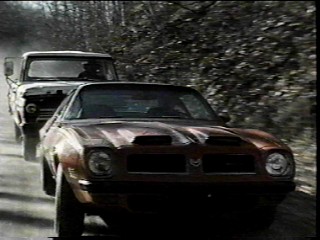 and "youth
oriented"
comedies (Porky's, Meatballs, Kinky Coaches And
The Pom Pom Pussycats).
One minor genre covered by several Canadians in this period that
doesn't
get much discussion is the Deliverance genre. They
include
movies like Sunday In The Country, Rituals,
and
Shoot,
where city folk out in the wilderness get terrorized in various
horrific
ways. Baker County, U.S.A. is another of those films,
and
just as unknown to the general public today. While no great shakes to
the
genre (and certainly not in any artistic ways!), it is a satisfying
hike,
even when it strays into familiar territory. and "youth
oriented"
comedies (Porky's, Meatballs, Kinky Coaches And
The Pom Pom Pussycats).
One minor genre covered by several Canadians in this period that
doesn't
get much discussion is the Deliverance genre. They
include
movies like Sunday In The Country, Rituals,
and
Shoot,
where city folk out in the wilderness get terrorized in various
horrific
ways. Baker County, U.S.A. is another of those films,
and
just as unknown to the general public today. While no great shakes to
the
genre (and certainly not in any artistic ways!), it is a satisfying
hike,
even when it strays into familiar territory.
Opening in the title place, we learn quickly that in
Baker County, they
do things a little differently there. Somewhere in the Tennessee
wilderness,
rifle-packing hillbilly leader Henry (Silva) meets his young sweetie by
the river, almost immediately slips off her dress (revealing no bra or
panties), and starts having sex with her right there. Interrupted by
two
young scaredy-cat cretins ("Oh, sheeet!") from the village, he gets up
and starts chasing them with his rifle. Meanwhile, at "Southeastern
Tennessee
State University", law student Roger (Campbell), a snotty,
holier-than-thou
youth, is arguing ethics with his professor in class. 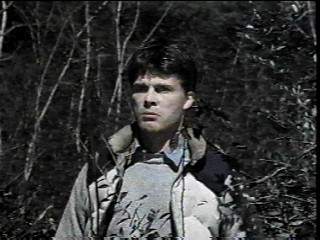 "How can we accept
an act of murder being anything but immoral?...Oh, I realize there can
be points where a person can be pushed to desperation. But desperation,
no matter how intense, can possibly justify the taking of another human
being's life!...Maybe it does for you, professor, but certainly not for
me!" In the back of the classroom, I poke my elbow into your side, dear
reader, and whisper with a smile, "Hmmm....I wonder what Rog will have
to do later in the movie!" Smiling, you whisper back, "Of course, Roger
is conveniently not discussing what if the one in trouble was him,
and he was cornered!" Then we giggle like hyenas until the prof throws
out of class. "How can we accept
an act of murder being anything but immoral?...Oh, I realize there can
be points where a person can be pushed to desperation. But desperation,
no matter how intense, can possibly justify the taking of another human
being's life!...Maybe it does for you, professor, but certainly not for
me!" In the back of the classroom, I poke my elbow into your side, dear
reader, and whisper with a smile, "Hmmm....I wonder what Rog will have
to do later in the movie!" Smiling, you whisper back, "Of course, Roger
is conveniently not discussing what if the one in trouble was him,
and he was cornered!" Then we giggle like hyenas until the prof throws
out of class.
The only reason I can think of that speech being there
is an attempt
at building some sort of character for Roger. Aside from that speech,
there
isn't really anything else done to show what kind of a person he is, or
what his background is. Especially less so for the characters
consisting
of his fiancÚ and another couple, who with Roger decide to go out
camping in the wilderness for a few days (Can you guess where?) More
successfully
realized is the character of Henry. Back in Baker County, he puts aside
the chasing of those two cretins when he finds his wife cheating with
another
man. The subsequent scenes show him to be a hypocrite, a bully enjoying
his
power over everyone else, and a outright dangerous man. Beating his
wife 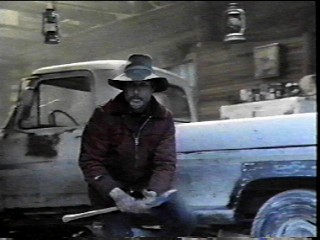 for her infidelity, he then gets the other villagers to help tar and
feather
his wife's lover. (While we only see the first part of the tarring, the
whole sequence is still pretty intense, seeing the long hell the
furious
Henry puts the blubbering guy through before actually picking up the
tar
brush.) After killing the guy, Henry soon finds out that Roger and his
friends accidentally witnessed the killing while camping out in the
woods.
He then makes plans to stop the four before they can report anything to
the authorities. Henry's subsequent actions, as well as the ones
previously,
do come off reasonably plausible. Silva also wisely keeps down his
character's
rage and outbursts to a reasonable volume and energy, so he doesn't
become
another hammy country bumpkin. He ends up being a pretty good villain,
both convincing and creepy enough.
for her infidelity, he then gets the other villagers to help tar and
feather
his wife's lover. (While we only see the first part of the tarring, the
whole sequence is still pretty intense, seeing the long hell the
furious
Henry puts the blubbering guy through before actually picking up the
tar
brush.) After killing the guy, Henry soon finds out that Roger and his
friends accidentally witnessed the killing while camping out in the
woods.
He then makes plans to stop the four before they can report anything to
the authorities. Henry's subsequent actions, as well as the ones
previously,
do come off reasonably plausible. Silva also wisely keeps down his
character's
rage and outbursts to a reasonable volume and energy, so he doesn't
become
another hammy country bumpkin. He ends up being a pretty good villain,
both convincing and creepy enough.
Though his acting (and everyone else's) is pretty good,
he could have
worked a little more on his wavering accent, however. There are a few
other
things to nitpick about the movie. One thing that may disappoint a lot
of viewers is that the body count in this movie is surprisingly low; in
fact, so low, there is an almost desperate attempt to increase the
count
near the end with the sudden appearance of someone who has no impact on
the plot at all. 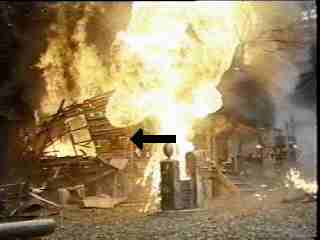 Some people will
also be disappointed that the movie takes
its time to get going, with the heroes finally finding themselves in
trouble
around the halfway mark. Then when they are in trouble, there are about
as many scenes of talking (mostly about the "rules" people follow in
the
area) as there are of scenes involving action or suspense. The four
young
adults also make a couple of decisions early on that, while I guess
such
decisions could have been decided upon if this was a real life
situation,
still seem quite stupid in retrospect. The movie is surprisingly well
photographed,
though their attempt at day-for-night photography during the night
scenes
looks very unprofessional. Some people will
also be disappointed that the movie takes
its time to get going, with the heroes finally finding themselves in
trouble
around the halfway mark. Then when they are in trouble, there are about
as many scenes of talking (mostly about the "rules" people follow in
the
area) as there are of scenes involving action or suspense. The four
young
adults also make a couple of decisions early on that, while I guess
such
decisions could have been decided upon if this was a real life
situation,
still seem quite stupid in retrospect. The movie is surprisingly well
photographed,
though their attempt at day-for-night photography during the night
scenes
looks very unprofessional.
Otherwise, the movie has a good look to it, making it
clear this particular
tax-shelter effort had a decent budget. The outdoor locations are well
chosen, with each shot managing to look different while convincing us
it's
all taking place in the same area. The hillbilly village set looks like
the real McCoy (or Hatfield, if you of that kin), looking weathered and
worn. The villagers themselves looked ragged, and their scenes in the
village
have an almost documentary feel to them. Fruet's direction also is good
in the more intense scenes. While he can't seem to do anything during
those
previously mentioned long scenes of talking, he knows how to bring out
as much suspense from a scene as possible. The more tense sequences are
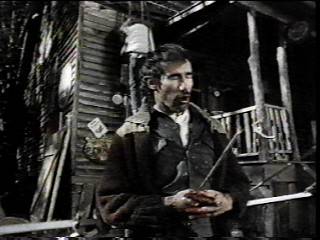 prolonged to heighten the fear and pain of the unlucky participants,
though
at the same time are carefully constructed so they don't go on too
long.
Moments that are more action-filled are briskly paced and filled with
some
excitement, including the long finale, which packs both an impressive
amount
of struggle and fighting, as well as some creativity (including a cool
bit with a TV antenna.) The whole sequence is very satisfying, and by
itself
makes up for many of the movie's shortcomings. Added to the other merit
found in the movie, and you have a pretty good piece of good-ol'-boy
entertainment.
prolonged to heighten the fear and pain of the unlucky participants,
though
at the same time are carefully constructed so they don't go on too
long.
Moments that are more action-filled are briskly paced and filled with
some
excitement, including the long finale, which packs both an impressive
amount
of struggle and fighting, as well as some creativity (including a cool
bit with a TV antenna.) The whole sequence is very satisfying, and by
itself
makes up for many of the movie's shortcomings. Added to the other merit
found in the movie, and you have a pretty good piece of good-ol'-boy
entertainment.
Check for availability on Amazon (DVD)
See also: The Annihilators,
The Road Hustlers, Rituals
|

 and "youth
oriented"
comedies (Porky's, Meatballs, Kinky Coaches And
The Pom Pom Pussycats).
One minor genre covered by several Canadians in this period that
doesn't
get much discussion is the Deliverance genre. They
include
movies like
and "youth
oriented"
comedies (Porky's, Meatballs, Kinky Coaches And
The Pom Pom Pussycats).
One minor genre covered by several Canadians in this period that
doesn't
get much discussion is the Deliverance genre. They
include
movies like  "How can we accept
an act of murder being anything but immoral?...Oh, I realize there can
be points where a person can be pushed to desperation. But desperation,
no matter how intense, can possibly justify the taking of another human
being's life!...Maybe it does for you, professor, but certainly not for
me!" In the back of the classroom, I poke my elbow into your side, dear
reader, and whisper with a smile, "Hmmm....I wonder what Rog will have
to do later in the movie!" Smiling, you whisper back, "Of course, Roger
is conveniently not discussing what if the one in trouble was him,
and he was cornered!" Then we giggle like hyenas until the prof throws
out of class.
"How can we accept
an act of murder being anything but immoral?...Oh, I realize there can
be points where a person can be pushed to desperation. But desperation,
no matter how intense, can possibly justify the taking of another human
being's life!...Maybe it does for you, professor, but certainly not for
me!" In the back of the classroom, I poke my elbow into your side, dear
reader, and whisper with a smile, "Hmmm....I wonder what Rog will have
to do later in the movie!" Smiling, you whisper back, "Of course, Roger
is conveniently not discussing what if the one in trouble was him,
and he was cornered!" Then we giggle like hyenas until the prof throws
out of class.
 for her infidelity, he then gets the other villagers to help tar and
feather
his wife's lover. (While we only see the first part of the tarring, the
whole sequence is still pretty intense, seeing the long hell the
furious
Henry puts the blubbering guy through before actually picking up the
tar
brush.) After killing the guy, Henry soon finds out that Roger and his
friends accidentally witnessed the killing while camping out in the
woods.
He then makes plans to stop the four before they can report anything to
the authorities. Henry's subsequent actions, as well as the ones
previously,
do come off reasonably plausible. Silva also wisely keeps down his
character's
rage and outbursts to a reasonable volume and energy, so he doesn't
become
another hammy country bumpkin. He ends up being a pretty good villain,
both convincing and creepy enough.
for her infidelity, he then gets the other villagers to help tar and
feather
his wife's lover. (While we only see the first part of the tarring, the
whole sequence is still pretty intense, seeing the long hell the
furious
Henry puts the blubbering guy through before actually picking up the
tar
brush.) After killing the guy, Henry soon finds out that Roger and his
friends accidentally witnessed the killing while camping out in the
woods.
He then makes plans to stop the four before they can report anything to
the authorities. Henry's subsequent actions, as well as the ones
previously,
do come off reasonably plausible. Silva also wisely keeps down his
character's
rage and outbursts to a reasonable volume and energy, so he doesn't
become
another hammy country bumpkin. He ends up being a pretty good villain,
both convincing and creepy enough.
 Some people will
also be disappointed that the movie takes
its time to get going, with the heroes finally finding themselves in
trouble
around the halfway mark. Then when they are in trouble, there are about
as many scenes of talking (mostly about the "rules" people follow in
the
area) as there are of scenes involving action or suspense. The four
young
adults also make a couple of decisions early on that, while I guess
such
decisions could have been decided upon if this was a real life
situation,
still seem quite stupid in retrospect. The movie is surprisingly well
photographed,
though their attempt at day-for-night photography during the night
scenes
looks very unprofessional.
Some people will
also be disappointed that the movie takes
its time to get going, with the heroes finally finding themselves in
trouble
around the halfway mark. Then when they are in trouble, there are about
as many scenes of talking (mostly about the "rules" people follow in
the
area) as there are of scenes involving action or suspense. The four
young
adults also make a couple of decisions early on that, while I guess
such
decisions could have been decided upon if this was a real life
situation,
still seem quite stupid in retrospect. The movie is surprisingly well
photographed,
though their attempt at day-for-night photography during the night
scenes
looks very unprofessional.
 prolonged to heighten the fear and pain of the unlucky participants,
though
at the same time are carefully constructed so they don't go on too
long.
Moments that are more action-filled are briskly paced and filled with
some
excitement, including the long finale, which packs both an impressive
amount
of struggle and fighting, as well as some creativity (including a cool
bit with a TV antenna.) The whole sequence is very satisfying, and by
itself
makes up for many of the movie's shortcomings. Added to the other merit
found in the movie, and you have a pretty good piece of good-ol'-boy
entertainment.
prolonged to heighten the fear and pain of the unlucky participants,
though
at the same time are carefully constructed so they don't go on too
long.
Moments that are more action-filled are briskly paced and filled with
some
excitement, including the long finale, which packs both an impressive
amount
of struggle and fighting, as well as some creativity (including a cool
bit with a TV antenna.) The whole sequence is very satisfying, and by
itself
makes up for many of the movie's shortcomings. Added to the other merit
found in the movie, and you have a pretty good piece of good-ol'-boy
entertainment.